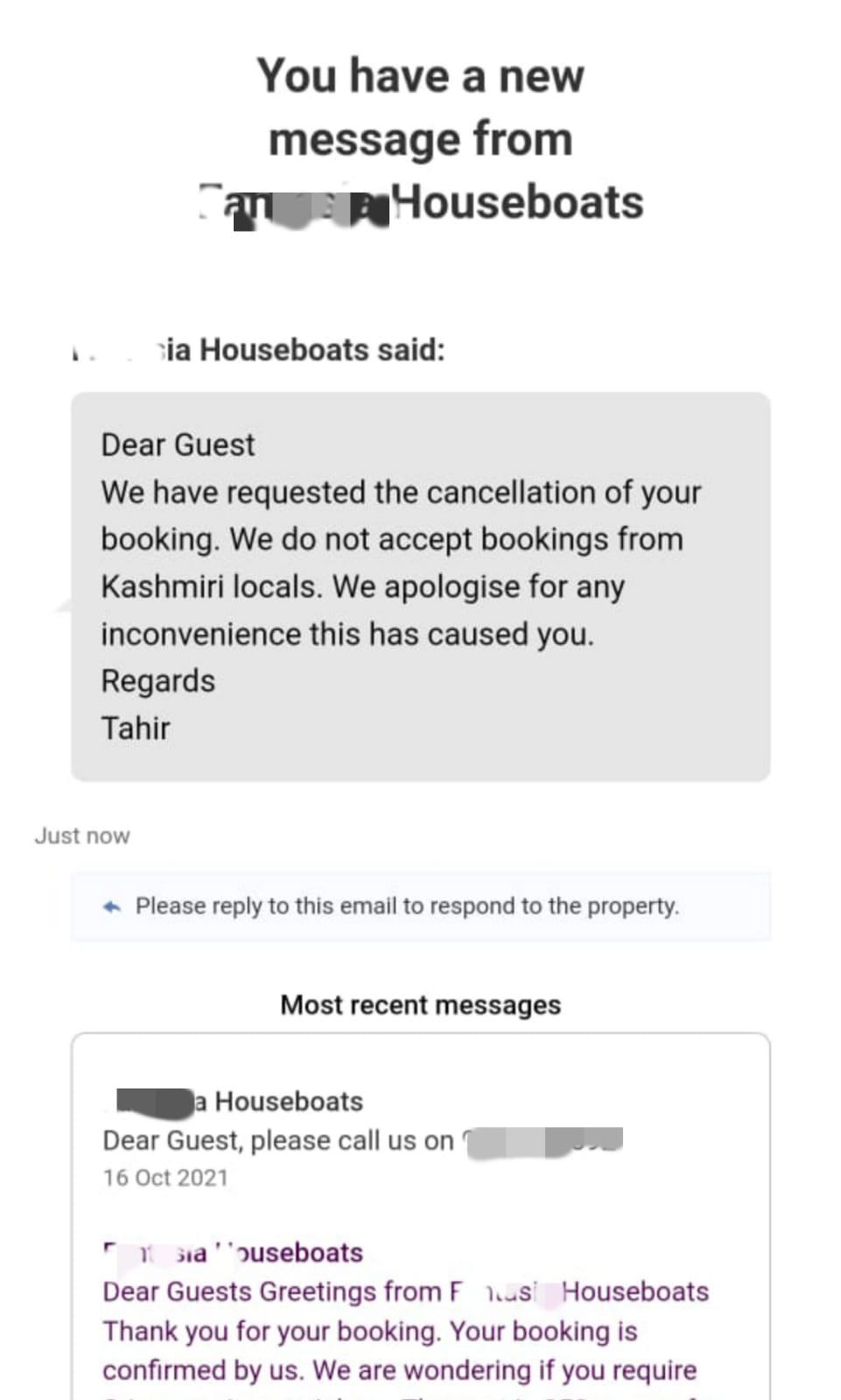Newlywed couple Aamir and Shazia regretted their decision to leave behind their festive home for the hostile houseboat.
Following a recent online booking, they travelled a distance of 60 kilometers to reach Srinagar. But the young couple from Anantnag were left dumbstruck when denied entry in a houseboat at Dal Lake.
They were planning to spend the seven ceremonial days of their marriage in a houseboat.
“I reached Srinagar at 10pm that day and called the houseboat manager for Shikara, but he kept rejecting my repeated calls,” Aamir told The Himalayan Post.
After a few minutes, he received a mail stating: ‘We don’t allow Kashmiris.’
 (Screenshot of the Mail)
(Screenshot of the Mail)
The mail came from the same houseboat which had earlier confirmed the booking.
Aamir called a few more houseboat owners for alternate booking. He was shocked when most of them asked him to reveal private documents like Nikkah Nama—Islamic certification of marriage—to register the sojourn.
“It was outrageous,” he said. “I mean who keeps such documents along for a hotel stay? Nikkah Nama is a deeply personal document and can’t be shared with everyone. It felt another form of policing in my own native land for availing a commercial space.”
Apart from houseboats, some hotels have also adopted this self-styled verification process.
“Nikkah Nama is compulsory for local couples to book a room,” said Mohammad Maqbool Lone, manager of Welcome Hotel. “No other validation like photographs from marriage ceremony can work as one can easily forge a duplicate photo with merging tools today. I will only allow couples who show me their Nikkah Nama.”
But then many married couples of Kashmir are wondering about the whole process and raising queries, like why do they need to show their personal documents for availing a commercial service?
“Nikkah Nama is needed for police verification,” Lone said. “We should have a proof with us that the couple is married.”
However, Sachit Sharma, SDPO, Nehru Park, told The Himalayan Post that the so-called police verification is an urban myth. “No such thing is in practice,” Sharma said. “There’re no restrictions for locals to book hotels and houseboats in Kashmir.”
But despite this official stance, when Areeba Shabir lately booked a houseboat for her friend’s pre-wedding shoot, she was asked to submit police verification. While her four non-local friends were given a space, she was asked to leave.
“It felt like a lesser citizen treatment,” she said. “The manager very rudely told me that they don’t allow locals. I didn’t want to visit the police station so I decided to go home instead.”
Among the reasons cited for disallowing locals in the houseboats are the native cultural and religious beliefs.
“We can’t register them [locals] as tourists, as our society can never allow certain things, even if the couple is married,” Tahir, a young houseboat owner, said. “I live in London and I have a foreign wife but the culture in Kashmir is far more different than the outside world. People judge here, and that’s why I decided not to lodge locals.”
Moral-policing and sermons asking houseboat owners not to board local couples are further shrinking space for Kashmiris.
“We do host Indian tourists and foreigners but their culture is different from ours,” Tariq Patloo, a houseboat owner justifying ban on local couples, said.
“Be it Kashmiri Pandit, Muslim or Sikh, our ethics and conscience won’t allow us to give space for adultery. But yes, if the family members are along, we have no problem hosting locals.”
But while these repeated rebuffs are now snowballing into raging points, Ghulam Rasool, President of the Houseboat Owner Association, told The Himalayan Post that no houseboats should stop the genuine local couple.
“Locals can stay,” he said. “We have no objection until and unless they are legal. Every houseboat manager must verify their credentials.”
But this assurance lately fell flat when the Anantnag couple was denied booking.
“It’s unacceptable that couples from all across India visit Kashmir as their exotic honeymoon destination but its residents cannot enjoy its beauty,” Shazia said. “Had they opened doors for locals, the houseboat community wouldn’t have become a hostage of uncertain tourism. They keep locals at arm’s length and then expect headway in social acceptance. It doesn’t work that way. It takes two to tango.”